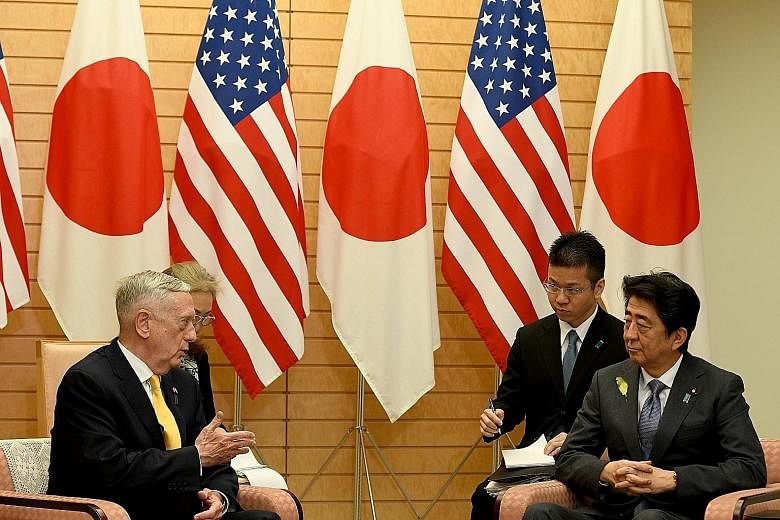TOKYO • The United States will uphold its commitment to Japan's security while it seeks to implement President Donald Trump's nuclear deal with North Korea, Defence Secretary James Mattis said yesterday.
"We're in the midst of very unprecedented negotiations right now with North Korea, but in this dynamic time, the long-standing alliance between Japan and the United States stands firm," Mr Mattis told reporters at Japan's Defence Ministry.
"We are not going to take our alliance with another democratic and free nation into account in this separate negotiation, so it stands firm."
Mr Mattis spoke at the end of a tour of Asian nations that stand to be affected by Mr Trump's June 12 deal with North Korean leader Kim Jong Un.
For Japan, the agreement, while welcome in its goal of stripping Pyongyang of its nuclear arsenal, has also generated anxiety about what concessions the US may make to achieve that objective.
Tokyo's alliance with Washington, including a US military footprint of about 50,000 troops, is a cornerstone of Japan's security strategy. But Mr Trump has repeatedly questioned long-standing alliances, including with South Korea and Nato.
The Trump administration, as part of its negotiating strategy with North Korea, has already halted military exercises it conducts with South Korea, another key Asian ally, and has suggested that its future troop presence in that nation could be reduced if the threat from North Korea subsides.
The Japanese government, meanwhile, has expressed concerns about North Korea's reliability in its commitment to denuclearise, pointing out that it has reneged on previous agreements.
Speaking before a meeting later in the day with Mr Mattis, Foreign Minister Taro Kono said United Nations resolutions against North Korea should be kept in place until the country shows progress in ending its nuclear programme and takes other steps to reduce the threat it poses to its neighbours.
"There was some step forward in North Korean issues, but I think we really need to keep our relations tight," he said. "There are a lot of things that still need to be worked on there."
For Japan, those steps must include not just giving up nuclear weapons, but also biological and chemical weapons and ballistic missiles of all ranges - not only long-range missiles that could reach the US.
Mr Mattis did not specifically address chemical and biological weapons in his public remarks, but said the US would maintain its approach of backing up the diplomatic effort with military strength.
"Especially now, we remain vigilant," he said.
Separately, a Japanese official said the country will next week pick a US-made advanced radar for its multibillion-dollar missile defence system, an upgrade that could help ease trade friction with Washington and provide cutting-edge protection against the arsenals of North Korea and China.
"Aegis will be a big-ticket purchase; it will be a nice gift for President Trump," said the official, referring to the ground-based Aegis Ashore system.
Although Japanese military planners still see North Korea as an immediate danger, they view China's growing military power as a bigger long-term threat.
Japanese officials could make their radar choice as early as next Monday for two Aegis Ashore batteries the country wants to deploy in 2023. That means the purchase can be added to a defence budget proposal slated for release in August, three sources with knowledge of the plan said, declining to be identified.
WASHINGTON POST, REUTERS

